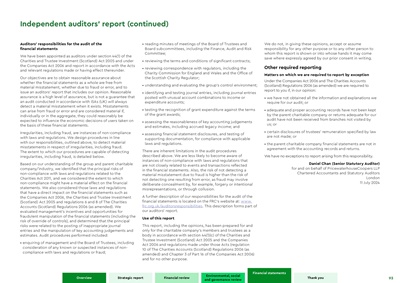
Auditors' responsibilities for the audit of the
financial statements
We have been appointed as auditors under section 44(1) of the
Charities and Trustee Investment (Scotland) Act 2005 and under
the Companies Act 2006 and report in accordance with the Acts
and relevant regulations made or having effect thereunder.
Our objectives are to obtain reasonable assurance about
whether the financial statements as a whole are free from
material misstatement, whether due to fraud or error, and to
issue an auditors' report that includes our opinion. Reasonable
assurance is a high level of assurance, but is not a guarantee that
an audit conducted in accordance with ISAs (UK) will always
detect a material misstatement when it exists. Misstatements
can arise from fraud or error and are considered material if,
individually or in the aggregate, they could reasonably be
expected to influence the economic decisions of users taken on
the basis of these financial statements.
Irregularities, including fraud, are instances of non-compliance
with laws and regulations. We design procedures in line
with our responsibilities, outlined above, to detect material
misstatements in respect of irregularities, including fraud.
The extent to which our procedures are capable of detecting
irregularities, including fraud, is detailed below.
Based on our understanding of the group and parent charitable
company/industry, we identified that the principal risks of
non-compliance with laws and regulations related to the
Charities Act 2011, and we considered the extent to which
non-compliance might have a material effect on the financial
statements. We also considered those laws and regulations
that have a direct impact on the financial statements such as
the Companies Act 2006, the Charities and Trustee Investment
(Scotland) Act 2005 and regulations 6 and 8 of The Charities
Accounts (Scotland) Regulations 2006 (as amended). We
evaluated management's incentives and opportunities for
fraudulent manipulation of the financial statements (including the
risk of override of controls), and determined that the principal
risks were related to the posting of inappropriate journal
entries and the manipulation of key accounting judgements and
estimates. Audit procedures performed included:
• enquiring of management and the Board of Trustees, including
consideration of any known or suspected instances of noncompliance
with laws and regulations or fraud;
• reading minutes of meetings of the Board of Trustees and
Board subcommittees, including the Finance, Audit and Risk
Committee;
• reviewing the terms and conditions of significant contracts;
• reviewing correspondence with regulators, including the
Charity Commission for England and Wales and the Office of
the Scottish Charity Regulator;
• understanding and evaluating the group's control environment;
• identifying and testing journal entries, including journal entries
posted with unusual account combinations to income or
expenditure accounts;
• testing the recognition of grant expenditure against the terms
of the grant awards;
• assessing the reasonableness of key accounting judgements
and estimates, including accrued legacy income; and
• assessing financial statement disclosures, and testing of
supporting documentation, for compliance with applicable
laws and regulations.
There are inherent limitations in the audit procedures
described above. We are less likely to become aware of
instances of non-compliance with laws and regulations that
are not closely related to events and transactions reflected
in the financial statements. Also, the risk of not detecting a
material misstatement due to fraud is higher than the risk of
not detecting one resulting from error, as fraud may involve
deliberate concealment by, for example, forgery or intentional
misrepresentations, or through collusion.
A further description of our responsibilities for the audit of the
financial statements is located on the FRC's website at: www.
frc.org.uk/auditorsresponsibilities. This description forms part of
our auditors' report.
Use of this report
This report, including the opinions, has been prepared for and
only for the charitable company's members and trustees as a
body in accordance with section 44(1)(c) of the Charities and
Trustee Investment (Scotland) Act 2005 and the Companies
Act 2006 and regulations made under those Acts (regulation
10 of The Charities Accounts (Scotland) Regulations 2006 (as
amended) and Chapter 3 of Part 16 of the Companies Act 2006)
and for no other purpose.
We do not, in giving these opinions, accept or assume
responsibility for any other purpose or to any other person to
whom this report is shown or into whose hands it may come
save where expressly agreed by our prior consent in writing.
Other required reporting
Matters on which we are required to report by exception
Under the Companies Act 2006 and The Charities Accounts
(Scotland) Regulations 2006 (as amended) we are required to
report to you if, in our opinion:
• we have not obtained all the information and explanations we
require for our audit; or
• adequate and proper accounting records have not been kept
by the parent charitable company or returns adequate for our
audit have not been received from branches not visited by
us; or
• certain disclosures of trustees' remuneration specified by law
are not made; or
• the parent charitable company financial statements are not in
agreement with the accounting records and returns.
We have no exceptions to report arising from this responsibility.
Daniel Chan (Senior Statutory Auditor)
for and on behalf of PricewaterhouseCoopers LLP
Chartered Accountants and Statutory Auditors
London
11 July 2024
Independent auditors' report (continued)
93
Environmental, social
and governance review
Financial review
Strategic report
Overview
Financial statements
Thank you